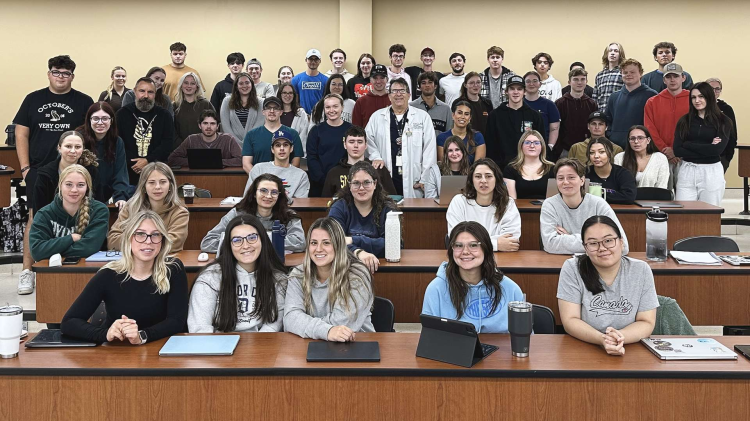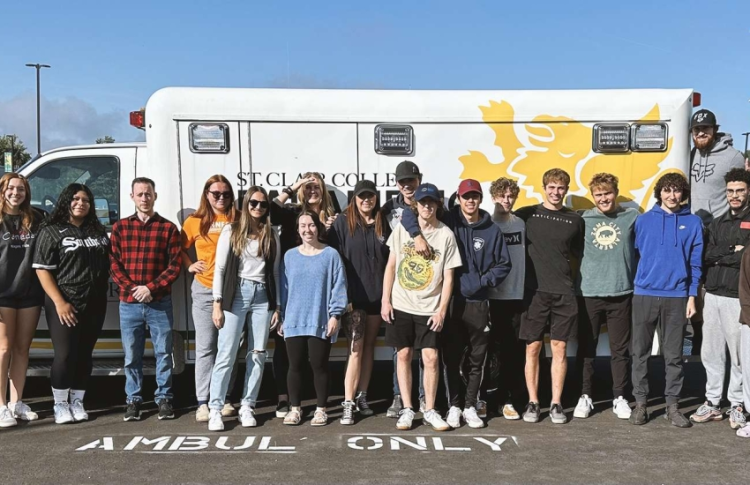
Students in the Paramedic program at St. Clair College pose for a photo in their classroom. (Stephanie DiFranceschi/St. Clair College)
St. Clair College has a longstanding reputation for producing highly skilled paramedics ready to
serve in challenging environments. But students and faculty recognize that learning to be a paramedic is about more than the hard skills they learn in the classroom, it's also about soft skills like mentorship and supporting one another.
The Paramedic Peer Mentorship program was established to by second-year Paramedic students to provide guidance and support and help shepherd first year students through the program.
It was created with the recognition that the journey to becoming a paramedic is rigorous and demanding, requiring students to master complex medical knowledge and critical hands-on skills. It can be overwhelming, especially for first-year students entering a high-stakes environment.
Second-year Paramedic students volunteer to mentor new students, offering advice on everything from study strategies to managing the pressures of clinical placements. These mentors have firsthand experience navigating the program's difficulties and can share valuable insights that go beyond textbooks. For many students, the peer mentorship initiative has been a lifeline, reducing stress and creating a sense of belonging within the program.
"Having gone through the same classes and similar stressors as the incoming students, it gives the mentors a unique perspective on how to help their mentee," said Abby Caldwell, a second-year Paramedic student and mentor. "Effective mentoring involves guiding, supporting, and encouraging students as they navigate the tough academic and personal journeys."
Peer mentorship at St. Clair isn't just about emotional support, it's also about academic excellence. Mentors often help guide their mentees through coursework, offering study tips and organizing review sessions ahead of exams.
This collaborative learning environment fosters a culture of academic success, with students pushing each other to excel. Mentees benefit from the mentors' experience with challenging topics like anatomy and physiology, pharmacology, and emergency medical procedures.
"It's no secret that getting through the paramedic program is difficult, however, I believe having this mentorship program in place will help more students find ways to succeed," Caldwell said.
This structured system also improves communication skills for both mentors and mentees. Mentors are responsible for translating their knowledge into effective teaching strategies, a critical skill for paramedics who need to communicate clearly with patients and healthcare teams in emergency situations.
The Peer Mentorship Program extends beyond the classroom and into clinical placements.
Paramedic students must demonstrate both technical and soft skills in real-life emergency settings. For first-year students, stepping into this environment for the first time can be intimidating. Peer mentors often share tips on staying calm under pressure and provide support during the transition into practical training.
Having an experienced student alongside can boost confidence, helping new students feel more prepared to tackle their clinical rotations. This added layer of support is essential for developing the emotional resilience needed in the paramedic profession, where high-pressure situations are the norm.
"There are so many opportunities outside of the scope of paramedicine that will benefit anyone who takes advantage of this opportunity," said Ryan Anderson, a first-year Paramedic mentee. "It will create relationships and connections between peers, faculty, and communities that will last long after the program. This will channel pathways and doors for so many of us first and second-year students who share the same passion and dedication to the vast world of paramedicine."
For second-year students, participating in the Peer Mentorship Program is an opportunity to develop leadership skills. As mentors, they take on the responsibility of guiding their peers, a role that mirrors the leadership they will need to exhibit in their careers. Mentoring and supporting colleagues is vital in emergency medical services, where paramedics often work in teams and need to trust and depend on each other.
"Being a paramedic requires more than just medical skills; it also demands strong leadership abilities," said Caldwell. "Being a leader to the first-year students also helps the mentors build and embody the qualities they will need to be a great paramedic after graduation. The mentorship program will be welcomed and useful by both mentor and mentee."
Mentors at St. Clair College are encouraged to take an active role in their peers' development, helping them set goals and overcome obstacles. In doing so, mentors also enhance their own decision-making and problem-solving abilities, making them better prepared for the fast-paced, unpredictable nature of paramedic work.
The Peer Mentorship Program is more than just a student support initiative- it's an integral part of St. Clair College's mission to foster compassion, leadership, and a sense of community in its Paramedic students. Graduates of the program leave with the technical skills required to save lives and the empathy and resilience necessary to make a difference in their communities.
Through mentorship, the College creates a ripple effect: mentors pass down knowledge, skills, and encouragement to the next generation, ensuring that every paramedic who graduates is fully equipped to step into the field with confidence. As a result, the program is helping shape a workforce of compassionate, competent paramedics ready to meet the challenges of tomorrow's healthcare landscape.
"Thanks to Professor John Lassaline, Dr. Stephanie DeFranceschi, second-year students, and so many of the Paramedic faculty for creating an amazing opportunity to create possibilities and provide resources to become successful in entering a paramedicine career," said Anderson.
In a profession where lives are on the line, the Peer Mentorship Program is making a big difference, ensuring that every paramedic who graduates is technically proficient and equipped with the interpersonal skills and emotional resilience necessary to thrive.

Students in the Paramedic program at St. Clair College pose for a photo in in front of a St. Clair College training ambulance. (Stephanie DiFranceschi/St. Clair College)













